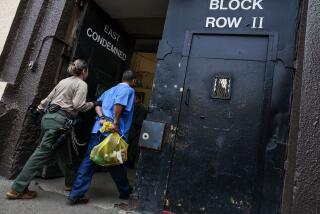Judge orders state to plan for mentally ill on death row
This post has been updated and corrected. See the notes below for details.
SACRAMENTO -- A federal judge has ordered California to come up with a plan to provide intensive, long-term psychiatric care to mentally ill prisoners on death row.
U.S. District Judge Lawrence Karlton’s order, issued Tuesday afternoon, says California made progress three years ago when it created a special program for the most seriously mentally ill prisoners on death row and earlier this year when it set aside 10 beds in a medical unit within the San Quentin Prison for their care. But, he said, those efforts fall short in both the level of care and the number of people it can treat. He called the current care “inadequate.”
Lawyers for mentally ill prisoners had asked the judge to require California to create a special place to treat death row inmates, since moving them to other prisons or hospitals is difficult.
“The solution is not, however, clear,” Karlton wrote. He ordered the state to negotiate a solution with a court-appointed special master. The judge also has ordered the state to immediately begin psychiatric evaluations to determine how many death row inmates require such intensive care.
[Updated 5:40 p.m. Dec. 10: Corrections spokeswoman Deborah Hoffman said state prison officials are “committed to providing quality medical and mental healthcare for all inmates and will continue to work with the court and the special master to ensure mentally ill inmates on death row receive proper care.”]
Michael Bien, the lead lawyer who had sought the order said he was “very happy.”
The order follows three weeks of hearings in November, during which prisoners’ lawyers cited four death row suicides over the past two years, and psychiatric reports that showed some death row inmates had digressed into insanity, laying catatonic on their cots or ranting through the night.
Early this year, prison officials moved half a dozen of those inmates into a specialized care program within San Quentin’s walls. Prison psychiatrists testified during the hearings that the condition of those inmates had improved.
Previously, long-term mental healthcare for death row inmates was available only at another prison psychiatric hospital, but condemned prisoners treated there were required to be locked up alone at all times, or the rest of the mental health ward shut down when they moved.
[For the record: 5:10 p.m. Dec. 10: A previous version of this post said the 10-bed unit for mentally ill condemned prisoners opened three years ago. It opened early this year.]
ALSO:
Lawyers challenge care for condemned
State alters policy on prison use of force
Tape shows mentally ill prisoners forced from cells
More to Read
Sign up for Essential California
The most important California stories and recommendations in your inbox every morning.
You may occasionally receive promotional content from the Los Angeles Times.











